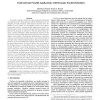Free Online Productivity Tools
i2Speak
i2Symbol
i2OCR
iTex2Img
iWeb2Print
iWeb2Shot
i2Type
iPdf2Split
iPdf2Merge
i2Bopomofo
i2Arabic
i2Style
i2Image
i2PDF
iLatex2Rtf
Sci2ools
114
click to vote
IPPS
2005
IEEE
2005
IEEE
Fault-Tolerant Parallel Applications with Dynamic Parallel Schedules
Commodity computer clusters are often composed of hundreds of computing nodes. These generally off-the-shelf systems are not designed for high reliability. Node failures therefore drive the MTBF of such clusters to unacceptable levels. The software frameworks used for running parallel applications need to be fault-tolerant in order to ensure continued execution despite node failures. We propose an extension to the flow graph based Dynamic Parallel Schedules (DPS) development framework that allows non-trivial parallel applications to pursue their execution despite node failures. The proposed fault-tolerance mechanism relies on a set of backup threads located in the volatile storage of alternate nodes. These backup threads are kept up to date by duplication of the transmitted data objects and periodical checkpointing of thread states. In case of a failure, the current state of the threads that were on the failed node is reconstructed on the backup threads by re-executing operations. The...
Backup Thread | Distributed And Parallel Computing | Execution Despite Node | IPPS 2005 | Node Failures |
Related Content
| Added | 25 Jun 2010 |
| Updated | 25 Jun 2010 |
| Type | Conference |
| Year | 2005 |
| Where | IPPS |
| Authors | Sebastian Gerlach, Roger D. Hersch |
Comments (0)

